Suffer the Children by Craig DiLouie
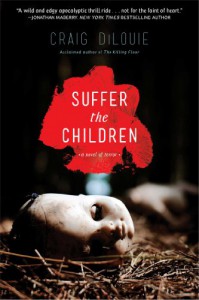
I was totally intrigued with the premise of this story.
One day, the children died.
All the children. All over the world.
It was a pandemic called the Herod's Syndrome, named after King Herod from the Bible. That guy who killed firstborns because he was told that a baby was born that night who would one day become king. But this is worse. Worse, even, than the 456 event from Torchwood (I did not watch that tv series, but heard of it) where an alien race known as 456 demanded 10% of the children population on Earth.
Because when all the children die, and if no children could be born anywhere without being affected by Herod's, then the human race could very well become extinct in the long-term. In the short-term, it becomes a socioecology problem, because how are so many little corpses to be buried all at once? Mass graves, rotting bodies everywhere, world in chaos with grieving parents mourning their children. And then...
Three days later, they come back.
And the parents were so happy to see their children; apparently alive (or at least bearing the appearance of not being dead), that they took the little corpses in, despite the stench of rot and decay. Because those children are still their children, and they're back.
This is where the line between the rights and wrongs begins to blur, because as a reader and an outsider, decidedly detached from the events of the story, it is easy to perceive what they're doing as wrong and yet so understandable and easy to sympathise with.
And then the children asked for blood.
With blood, they stop being dead. They become the children they once were.
I have a bit of difficulty seeing this with my mind's eye, actually. I can't see how the half-rotting corpses, with discoloured skin and gray teeth and whatnot, could possibly look alive again, with healthy skin and shining eyes, the way they were before the Herod Event struck.
But this life, such as it was, had an expiration. Every pint of blood gives them an hour.
Too soon, they die again. And need more blood to live ...
And that's when things get ugly, and progressively uglier as you read on. The story is told from parents' POV, therefore you get firsthand narration on the things that parents would do (anything), the lengths that they would go to, in order to keep their precious babies alive.
Having read it, I'd expected it to be more shocking, but I think it's a pretty good story and rather well thought-out. Without unnecessary gore and violence to increase shock value, which is definitely a plus.
Maleficent by Elizabeth Rudnick

Here we have Maleficent, the wicked fairygodmother to Aurora, aka Sleeping Beauty. The princess is the side character here; this is Maleficent's malevolent and magnificent tale, in which she is both the heroine and the villainess. Unlike the Disney adaptation, which was maledicted with instalove and inexplicable evil that seemed to exist solely to be evil, Maleficent here is a morally grey character, although still a bit inexplicable at times.
I do not know how much freedom the author has been given in this novelisation effort, but it reads like a faithful transcribe, with minimal fleshing out of characters and events. Therefore, it is subject to the same shortcomings that movies generally face: the short duration utilisable to tell the story usually necessitates in cutting off corners when it comes to, for example, world-building and character development. I have not watched the movie, though, so I cannot confirm this.
The story is told in a narrative matter-of-fact writing style, giving the impression of telling instead of showing. I felt like I was being told what happens in the movie, scene after scene. I'm sure the actors brought the characters to life, with gestures and body languages, which are sadly lacking in this book. Character study/Introspection is weak, hardly delving into the characters' thoughts - everything extra added seems to be on the surface.
In summary, the fairies of the moor are in a state of perpetual warfare with humans, for land and freedom. In the midst of this, you get a fairy/human love story, and I am not a writer, so if you want to know more, you should read the novella. It's only 130 pages long. Or just watch the movie, because I suspect that would be the better option. You'll find out why Maleficent becomes wicked, and it leads on to Sleeping Beauty as we know it (by which I mean the modernised version by Disney), but retold with some twists, some snark, some clichés, and a whole load of redemption.
Example of the writing in this book that I do not like:
-For some reason Maleficent becomes the de facto leader of a battle between fairies and humans, without any explanation as to why, since there should be others older and more experienced than her. Apparently the movie decided to skip the reasons why, and the book decided to follow suit?
-There is hardly any description of the Moors in which the fairies lived. We're told that it is beautiful and has a lake full of jewels (because it's necessary to the plot), and the rest is simply left to the imagination.
-Poor description of a battle sequence: They moved forward and backward, their motions a terrifying mockery of a romantic waltz. - and that's all she wrote. Right. I have read canon-compliant fanfics written better than this.
I believe this book would work excellently as a bedtime story narrated by a parent to his/her child. As a reader, though, I expect the characters between the pages to come to life for me, instead of needing life breathed into it, and this falls short of the mark.
The Insects of Love by Genevieve Valentine

I have read and loved stories that raises questions which are left unanswered. This is not one of them. Possibly because I wasn't expecting this kind of story, I think the premise would have been better utilised in the mystery/crime genre, with the tattoo and the letters written by the sister who disappeared really were clues for the other sister to find her. But perhaps Genevieve Valentine was not that kind of author.
And instead we get a sci-fi/fantasy novelette that tells of several possible realities, which explains the contradictory events described by possibly unreliable narattors. It gave me the impression that the author does not know exactly what story she wants to tell, and having several possible storylines, decided to use them all. There is no need to give a summary of The Insects of Love, because the entire tale is an elaboration of what is already given in the synopsis; one sister has a tattoo and disappears, the other is an insect expert and perhaps queer in the attic.
In conclusion, I do not think this story was surreal enough to pull off what I think the author was trying to do.
Ponies by Kij Johnson

Overhyped and overrated, in my opinion.
Oh, I know this is the sort of story that some reviewers would love - there is plenty to analyse and write about, certainly, but there is not one story ever told that would please everybody who read it, and this story I did not like. But to be fair, I doubted I was going to like a story involving unicorns. I merely read it because I was curious and wanted to form my own opinion of the story.
So, it's about a girl called Barbara and her unicorn Sunny, and to fit in she has to sacrifice her Unicorn's horn and wings, turning Sunny into a Pony, because that's what happens to all the Unicorns when they go to The Party. They become Ponies. I have no objection to the storyline - it is just not one that interests me particularly, because I never was and still am not the girl who desired to fit in. When I was in school, I spent my lunch breaks in the library, surrounded by books, and if I had been Barbara, we would have stayed at home and read books together.
There is so much symbolism in this story - I'm sure that if you think about it, the horn, the wings and the voice each represent something. Wings, for example, could easily represent freedom, that you have to give up to be one of the crowd, because there are rules, then, that must be followed if you do not want to be an outcast. This story, despite its fantasy setting, with improbable mythical creatures, parallels much of real life - in particular the social interaction; the desire to fit in that applies to many people regardless of their age. And it is sometimes very sad, that when people succumb to peer pressure , they do things that they had no wish to do because they felt that they had no other choice.
This story spun its way to its tragic end - as shown by the cover, thus not a spoiler - Again, there is a parallel with real life, that people do not like it when others are different. You can draw comparisons between Barbara not being accepted because she was a Girl Who Does Not Have A Pony, with many other things - such as racism, classism, sexism, etc.
My verdict, in short, is that: As a story, this was well thought out and well-written, yes, very much so. But its entertainment value is virtually nil to me.
The Cat Who Walked a Thousand Miles by Kij Johnson

Set in Japan many years ago, this story began with a family of female cats living in the garden of an abandoned house, where they have all the comforts they could wish for - trees to climb, mice to hunt, streams of water, etc. These cats teach other the fudoki; the tales of their ancestors, passed down from generation to generation.
And in this little haven of a home, Small Cat was born. Under these circumstances, she lived a happy, idyllic childhood, but as with all happy idyllic things, it doesn't last. Disaster struck in the form of a raging fire, and all the cats were left without a home and separated from each other.
Now all the small cat has left was her fudoki. Her favourite tale was The Cat From The North - and so she decided there's where she would go. To find the home of her feline ancestors. And thus began her journey of a thousand miles.
Along the way she had many adventures, landed herself in mortal peril several times, nearly joined another family of cats but realised she couldn't when they asked if she was ready to learn their fudoki, and ran away. At one point she nearly became The Cat Who Climbed Mount Fuji instead, and it was a good thing she did not, for I doubt she would've lived to tell the tale.
To conclude, this story is cute. Light reading, and if you're looking for dark fantasy, look elsewhere :P
The Witch of Duva by Leigh Bardugo
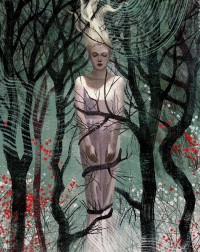
This is my second foray into the story universe of Grisha, after The Too-Clever Fox. It is also the latest of the dark fantasy stories I've been reading of late. A dark retelling of Hansel & Gretel, but mainly focuses on Gretel Nadya - her brother and father does not feature much in most of the story.
The prose is lovely, dark and creepy - worth a read. There is a plot twist,
but unexpected mainly due to lack of foreshadowing rather than clever manipulation of the reader's perception.
(show spoiler)But it is, after all, a novelette of short length, and as such allowances has to be made.
Mother, Crone, Maiden by Cat Hellisen

A marketing ploy, perhaps, but quite a nicely written one. It raises questions, you see, that I would like answers to, and for that I'll have to read When the Sea Is Rising Red
About Ilken:
Ilken has 3 choices - to be a mother, crone or maiden. In the first, she marries someone her father chose for her and then walked the well-trodden path; in the second, she runs away from marriage and became a spinster outcast; and in the third, she dies. Not very appealing choices, in my opinion, unless if she's the sort of character to choose the first option, and if she had been then we'd not have this story. It is, however, not death as final as most deaths are in our world, and Ilken returns - in a form of a "boggert" (the name of which reminds me strongly of boggarts from Harry Potter series, and that is not a good thing). A boggert seems to suck life forces out of people in order to survive, which sounds a bit like a combination of vampire and succubus, but without the blood and sex, which sounds boring, but to know more I'll have to read When the Sea Is Rising Red , which I've now shelved in my to-read list. Muahahahahaha.
The Girl Who Ruled Fairyland - For a Little While by Catherynne M. Valente

This is a pretty, pretty little prologue of a tale, set in the Days Long Past, many a year before a girl called September came along and became The Girl Who Circumnavigated Fairyland in a Ship of Her Own Making.
If you've never read the series before, this could be a good place to start, to see if you like C.M. Valente's style. I personally think it is a hit-or-miss, as she sometimes waxes lyrical for paragraphs on end, and while it is very pretty indeed, sometimes it lacks substance. Take for instance this novelette, it began with 4 paragraphs and 3 lines that tells you nothing at all, before the story properly starts.
For those with knowledge of Mallow's eventual fate , this is heart-breaking. Not a spoiler, by the way - you can surmise that much, I'm sure, from the title.
The Walking-Stick Forest by Anna Tambour

Oh, this is lovely, like its cover. Dark. Creepy. Intrinsically violent, but beautifully so.
Farquar is a complex character. He evidently lives in the centre of a world of his own making. At one point I thought he could be kind. The next I thought he was a black-hearted scoundrel, with a soul as dark as his precious walking-stick forest at night. It's a cycle repeated several times over.
About the girl, though :
Her name is Rose. She has a history that is only implied at. It's one of the several scenes mentioned in Editor's Note for which a trigger warning is necessary. Speaking of which, people who are easily triggered by acts of violent and descriptions of assassinations, no matter how beautifully/artfully executed, should avoid this novelette, because Farquar and Hannibal Lecter could sit at a table in a room of sweet-smelling flowers and drink tea together.
Story could be found at Tor here: http://www.tor.com/stories/2014/05/the-walking-stick-forest-anna-tambour
We Have Always Lived on Mars by Cecil Castellucci
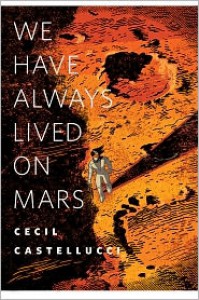
A novella narrated by a nondescript main character, but an enjoyable read nevertheless.. until I reached the ending, upon which I thought "That's all?" Because in such a down-to-earth story, one cannot dispense with explanations without risking dissatisfaction, and I am dissatisfied. There are obviously secretssssssss - which the author, sadly, did not bother to reveal.
It seems a pity to end the story with so many loose ends. It is , however, not a unique idea, and I'm sure I'll get round to reading another story with a similar plot. Some day. :P
The Too-Clever Fox by Leigh Bardugo

This is a cute story set in the world of talking animals. It is a lot like one of those short stories I read when I was a child, in hardcover volumes of fairytales that I still have on my shelves.
Koja is one of those foxes that brings to life the idiom as cunning as a fox. He understands the nature of his contemporaries, which he demonstrates by observing their behaviour and then using the knowledge to manipulate them. His perils and misfortunes are somewhat cliché, but makes for easy, fun reading nevertheless.
(show spoiler)
The Fault In Our Stars by John Green
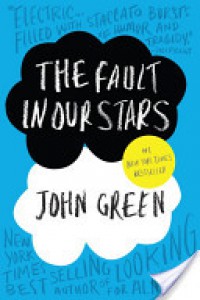
I’m Hazel, I’d say when they’d get to me. Sixteen. Thyroid originally but with an impressive and long-settled satellite colony in my lungs.
Hazel was, at the beginning of the story, a somewhat depressed character. She was terminally ill, her death prognosticated at her diagnosis. Her depression is, she says, not a side effect of cancer. It is a side effect of dying. Cancer is a side effect of dying. Everything is a side effect of dying.
Hazel's parents makes her attend a Support Group with a rotating cast of members (side effect of dying) , where she meets characters like Isaac (hilarious guy, especially when playing video games), Patrick (tells the same cancer survivor story every week) and she has her own healthy BFF, Kaitlyn, whose existence I kept forgetting.
Family relationships
Me: “I refuse to attend Support Group.”
Mom: “One of the symptoms of depression is disinterest in activities.”
Me: “Please just let me watch America’s Next Top Model. It’s an activity.”
Mom: “Television is a passivity.”
Hazel's mother is more fleshed out as a character than her father. The only thing I know about the poor man is that he works in an office and that he tries very hard not to cry, often with little success.
I went to Support Group for the same reason that I’d once allowed nurses with a mere eighteen months of graduate education to poison me with exotically named chemicals: I wanted to make my parents happy. There is only one thing in this world shittier than biting it from cancer when you’re sixteen, and that’s having a kid who bites it from cancer.
Cancer doesn't only affect the patient. It often affects the entire family - emotionally and financially. I've had a relative who died from cancer, but when she was alive, her siblings pooled their resources to finance the very expensive series of treatments where one needle shot costed thousands. They had to take time off to drive her around to places for treatments, to religious events, and to handle all the extra care she needed.
The Romance
The Hazel/Augustus love story takes up a significant portion of this book - more than I initially expected, but was quickly resigned to. They were introduced rather early on the story and then proceeded to fell in love with each other rather rapidly.
(show spoiler)
Augustus is a pretty boy who, thankfully, seems to have some brain cells in his head, He says pretentious things like "my thoughts are stars I can’t fathom into constellations." But then there are times when he sounded like a teenage FANGIRL. Example:
(show spoiler)
There's this declaration of always/forever that fictional characters always make to each other - this promise of infinity that is a paradox in itself, because nothing lasts forever and everything ends, and they know this, especially characters in a story like this, who knows that forever is a beautiful lie, a promise that cannot be kept. They promise it anyway, and I don't get it, because Death will inevitably separate them even if nothing else does.
 1
1
Daughter of Smoke and Bone by Laini Taylor

This story, like all fairytales, began with requisite once upon a time.
“Once upon a time, an angel lay dying in the mist.
And a devil knelt over him and smiled.”
There are many ways to misintepret the quotation above.
1.You might think it is a typical angel/demon story.
Actually, no. These creatures are not of the divine angels of Heaven or fallen followers of Lucifer variety. Here we have seraphs, a race of fiery-winged humanoids loosely based on the aforementioned angels. The devils are chimaeras, beasts of haphazard animal and human body parts.
2.You might think the devil would be happy to see the angel dying, and has come to finish it off.
Again, no. When the devil finds the angel dying in a battefield, contrary to the ominous vibe as per quotation above, she smiled at him and then did not kill him. Instead, she saved him, and that's how the love story began.
If you could call it a love story. That is, imo, debatable.
THE CHARACTERS
- Karou : Protagonist blue-haired human girl, badass. She runs errands collecting teeth. She could fight off groups of angels with tattoos. She has strings of wish-granting pebbles. She is, quite often, quite cool. I should like her, but sometimes I do and sometimes I don't. Sometimes I wish she'd just lose her temper and start yelling.
-Akiva : The Love Interest. Boring pretty boy. He has wings! With FIRE on them.
(show spoiler)
- Zuzana : The Best Friend. Possibly my favourite character in this book. Outspoken, absolutely hilarious, shows great concern and protectiveness over her best friend, and a mistress of the eyebrow arch. She won me over with this:
“...You are not just going to vanish like this, Karou. This isn't some goddamn Narnia book.”
I'm easily won over, apparently.
and Mik. Well, Mik comes into more prominence later.
THE PROSE
Scattered all over the book are pages and pages of gems like this:
“It is a condition of monsters that they do not perceive themselves as such. The dragon, you know, hunkered in the village devouring maidens, heard the townsfolk cry 'Monster!' and looked behind him.”
But sometimes, just sometimes, it gets a bit too purple. Especially when it comes to describing how beautiful the characters are. Karou, for instance, moves like a poem and smiles like a sphinx, and I am utterly unappreciative of purple prose.
and
....do monsters make war, or does war make monsters?”
I love it when a character in a book brings up issues like this, because I'd think of Harry Potter (in this case) and answer (in my head) that it is a circle without a beginning, like the phoenix and the egg.
I could've had deep thoughts and soulful reflections instead, but whatever.
THE SETTING
Prague: a city of alchemists and dreamers, its medieval cobbles once trod by golems, mystics, invading armies. The wind carried the memory of magic, revolution, violins, and the cobbled lanes meandered like creeks. Thugs wore Motzart wigs and pushed chamber music on street corners, and marionettes hung in windows, making the whole city seem like a theater with unseen puppeteers crouched behind velvet.
And magic doorways to different worlds
THE ROMANCE
I have no objection to unconventional love stories involving
i) characters of different species,
ii) born in different worlds,
iii) who can't be together because of reasons.
iv) Especially if the story transcends all of time and space and incarnations
[insert pic of my OTP pairing. If you know me, you know which one. Clue: Doctor Who]
But hell, I feel like I'm insulting my OTP by mentioning them in comparison to Karou & Akiva.
There is no substance in this romance. It's filled with them mooning at each other, mooning around each other and mooning when they're apart from each other. There's stuff about worshipping the moon (not literally), the moon that is the goddess of assassins and secret lovers, and it's all very pretty to read but substantially the romance is boring, and I just can't ship them, because how on earth could you build a proper, long-lasting relationship on moonlight trysts and romantic banter? Show me instead how well they match each other, how they make each other better, why I should want them together rather than apart. Just telling me how absolutely beautiful they look as a couple doesn't convince me, not even with UST galore.
This review was initially meant the cover the entire trilogy plus the novella in between, but it got too long. Damn.
In the Greenwood by Mari Ness
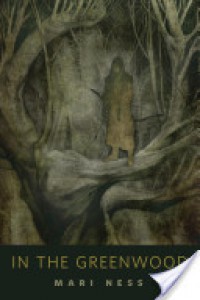
She is the lady in the tower, stealing secrets when she can, kisses when she cannot.
He is the thief in the woods, stealing from the rich when he can, from the poor when he cannot.
A retelling of Robin Hood, with a dark twist.
Lovely prose!
Story found here: http://www.tor.com/stories/2013/12/in-the-greenwood-mari-ness
Writ of Years by Brit Mandelo

I've read such stories before, of magical cursed objects and their owners, victims of avarice. Such stories never have happy endings, and this one spun slowly to its inevitable end. The keyword here, is slow. The pacing improved towards the end, but I felt it was a bit sluggish for most parts.
I think one of the themes in this story is addiction. From the introduction of the main character as an alcoholic, you know this guy is not going to be good at resisting temptations. True enough, he succumbed not once, not twice, but again and again, until his life is forfeit, and even at death's door he was in the grips of addiction, unable to let go.
This story is of horror, in more ways than one.
The School for Good and Evil by Soman Chainani

“Once upon a time, there were two girls.
One was beautiful and beloved and the other was a lonely hag.”
“I like our story,” Sophie said.
“It hasn’t gotten to the part where your prince punches you,” said Agatha.
:D
First we have Sophie, the fairest of fair maidens.
To sustain her beauty (waist-length hair of spun gold, jade green eyes, and creamy peach skin), she follows an extensive beauty routine consisting of "goose feathers, pickled potatoes, horse hooves, cream of cashews, and a vial of cow’s blood".
Looks like a princess, acts like a princess, but a witch.
Then we have Agatha, the most hideous of hags.
Her hideous dome of black hair looked like it was coated in oil. Her hulking black dress, shapeless as a potato sack, couldn’t hide freakishly pale skin and jutting bones. Ladybug eyes bulged from her sunken face.
But Agatha is the one who holds the moral compass, who has the heart of gold, who saves people and make them better.
Together, they caused mayhem, started a revolution, and fell in love (not with each other), and had their friendship tested.
“F is for ‘Faith,’” Sophie said. “Which I thought you had in me.”
And in the manner of all fairytales, they fought an epic battle of Good vs Evil... with an ending that makes any sequels unnecessary. I'll recommend reading this book, but not the next.
(show spoiler)


